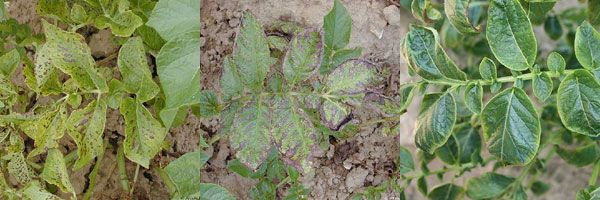
Deficiency or phytotoxicity of mineral elements
The search of an optimal productivity and quality of patatoes involves, among other things, a good nutritional management of plants.
Deficiencies in macronutrients, which are required in large quantities or in micronutrients can reduce the growth of the vegetative system (haulm and underground organs) and the length of the growing cycle, and hence can reduce tuber growth and crop productivity. Some deficiencies (e.g. potassium) increase tuber susceptibility to damage such as internal blackspot.
Conversely, excessive application of fertilisers can also upset the nutritional balance and reduce tuber productivity.
- Fertilization management
Good nutritional management is required for the quality and the productivity of the potato crop and it must be adapted to the crop's characteristics. These include the soil type, the type of production (seed, table or processed potatoes) and the expected yield.
The quality of fertilizer distribution in addition of the soil preparation and water management are important for the nutrient availability to the plants. This is particularly true for nutrients which are not very mobile in the soil. These factors are often predominant as severe direct nutrient deficiencies are quite rare in potato production.
Nutritional management of potato crops includes an adequate supply of fertilizers with macro and micronutrients, according to the nutrients availability in the soil, the soil type and the crop requirement. It is also related to a good soil structure, favourable to an efficient root system, to absorbable forms for optimal nutrient uptake and to chemical balance between the different nutrients. Acid or basic soils are more susceptible to nutrient deficiences.





